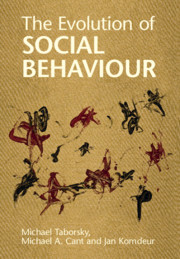Conflict
Published online by Cambridge University Press: 30 July 2021
Summary
Humans exhibit a rare life history in which females stop reproducing midway through life. Only a handful of other wild mammals exhibit a similar menopausal life history. The theory of kin selection suggests that post-reproductive survival can be favoured where older females confer fitness benefits on their offspring (the grandmother hypothesis). Numerous studies have shown that older females do help to boost the fitness of their offspring, but such helping benefits are too small to favour reproductive cessation in humans at the observed age of 40–50 years old. Recent models of ‘kinship dynamics’ suggest that reproductive conflict between generations is a missing factor in the evolution of post-reproductive lifespan. The models further suggest that humans and some cetaceans are predisposed to the evolution of menopause as a consequence of their unusual, and distinct, patterns of mating and dispersal, providing an explanation for the strange taxonomic distribution of this trait. Tests of these models in humans support the predicted effect of demography on patterns of kinship and provide evidence of intergenerational reproductive conflict in some societies. Recent tests of the models in a wild population of another menopausal mammal, the killer whale, have found strong support for the model predictions. Studies of the family conflict in other long-lived mammals can shed new light on how the unusual human life history evolved.
- Type
- Chapter
- Information
- The Evolution of Social Behaviour , pp. 321 - 326Publisher: Cambridge University PressPrint publication year: 2021



